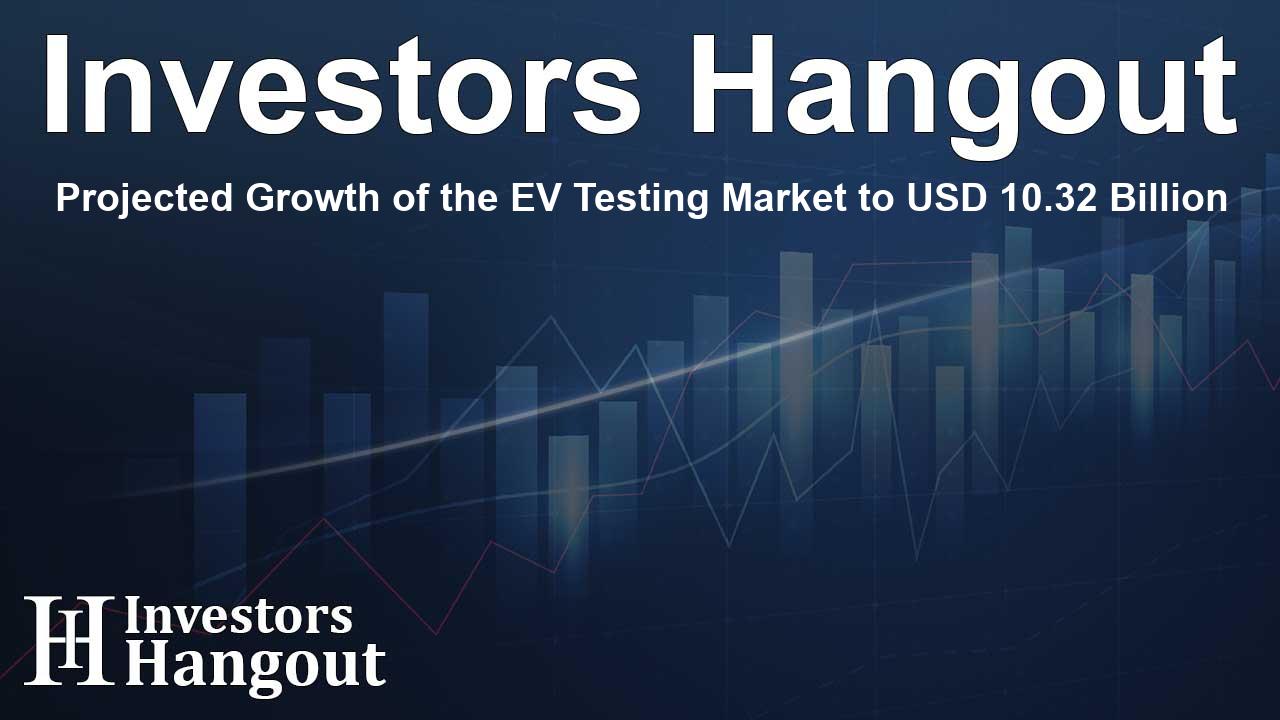Projected Growth of the EV Testing Market to USD 10.32 Billion

Electric Vehicle Testing, Inspection, and Certification Market Overview
The global electric vehicle (EV) testing, inspection, and certification market is on an impressive growth trajectory, anticipated to reach USD 10.32 billion. As the push for electric vehicles intensifies, with increasing global adoption and heightened regulatory scrutiny on safety and environmental standards, the market's potential is substantial.
Current Market Value and Future Projections
Currently valued at USD 4.65 billion, the market forecast highlights significant expansion over the next decade. With the rapid evolution of battery technology and autonomous vehicle functionalities, the demand for rigorous testing standards is paramount. Factors such as government investment in EV infrastructure alongside rising consumer expectations for quality and safety are propelling this growth.
Regional Insights and Market Dynamics
Asia Pacific leads the charge in the EV testing sector, driven by robust digital infrastructure and government initiatives aimed at managing renewable energy resources. The increased focus on sustainability and smart grid technology further supports this growth.
European Market Expansion
The European market is also witnessing rapid growth as traditional automotive companies pivot toward electric alternatives. The integration of renewable energy sources into existing grids and the adoption of cloud-based solutions enhance operational efficiencies while bolstering regulatory compliance.
Key Segments of the EV Testing Market
The market is segmented by testing and inspection services, certification and compliance services, and end-user demographics. Among testing services, battery testing and performance evaluation are crucial as they assure consumers of the durability and safety of their vehicles. The rise in electric vehicle technologies necessitates that manufacturers prioritize these services to maintain a competitive edge.
Certification and Compliance Services
Regulatory compliance is a major segment, encompassing emission standards and safety protocols. Electric vehicle manufacturers extensively rely on certified facilities to navigate an evolving landscape of safety regulations worldwide.
Technological Innovations Driving the Market
Advancements in technology, such as the rise of blockchain for energy transactions and the adoption of edge computing, are pivotal in transforming the landscape of the EV testing market. Blockchain enhances transparency in energy trading and battery lifecycle management, while edge computing aids faster data processing closer to energy assets, reducing latency.
The Role of Government and Private Investments
Government investments are crucial in scaling infrastructure and enhancing testing facilities to ensure that they can support new technologies effectively. Partnerships between public sectors and private companies are expanding capabilities and improving compliance processes across the board.
Challenges Within the EV Testing Market
Despite the promising growth, challenges related to data security and privacy remain prevalent. Concerns about cyber threats and data breaches compel organizations to invest in advanced encryption technologies and cybersecurity measures to safeguard sensitive information.
Opportunities for Sustainability
There is a growing opportunity for firms to enhance their sustainability initiatives through cloud-based solutions that optimize energy usage and track emissions. As company objectives align closely with environmental, social, and governance (ESG) goals, the demand for innovative energy-management solutions is surging.
Market Companies Making Waves
Leading companies in the EV testing, inspection, and certification industry include TÜV SÜD Group, SGS Group, and Bureau Veritas SA. These organizations are pivotal in setting high standards in testing and certification across the automotive sector.
Recent Developments in Electric Vehicle Testing
As of the latest updates, companies like Denso Corporation have announced advancements in battery technology, promising to enhance performance and improve charging efficiency. Such innovations are essential for meeting the increasing demands of the EV market.
Frequently Asked Questions
1. What is the current value of the EV testing market?
The electric vehicle testing, inspection, and certification market is currently valued at approximately USD 4.65 billion.
2. What is driving the growth of the EV testing market?
The growth is driven by rising global adoption of electric vehicles, stringent safety regulations, and technological advancements.
3. Which region dominates the EV testing market?
Asia Pacific currently dominates the EV testing market, closely followed by Europe due to growing infrastructure investments and regulatory initiatives.
4. What are the main challenges facing the market?
Significant challenges include data security concerns and the need for continuous investment in advanced testing technologies.
5. Who are the key players in the EV testing market?
Key players include TÜV SÜD Group, SGS Group, and Bureau Veritas SA, among others. These organizations are essential for maintaining high testing and certification standards.
About The Author
Contact Lucas Young privately here. Or send an email with ATTN: Lucas Young as the subject to contact@investorshangout.com.
About Investors Hangout
Investors Hangout is a leading online stock forum for financial discussion and learning, offering a wide range of free tools and resources. It draws in traders of all levels, who exchange market knowledge, investigate trading tactics, and keep an eye on industry developments in real time. Featuring financial articles, stock message boards, quotes, charts, company profiles, and live news updates. Through cooperative learning and a wealth of informational resources, it helps users from novices creating their first portfolios to experts honing their techniques. Join Investors Hangout today: https://investorshangout.com/
The content of this article is based on factual, publicly available information and does not represent legal, financial, or investment advice. Investors Hangout does not offer financial advice, and the author is not a licensed financial advisor. Consult a qualified advisor before making any financial or investment decisions based on this article. This article should not be considered advice to purchase, sell, or hold any securities or other investments. If any of the material provided here is inaccurate, please contact us for corrections.
